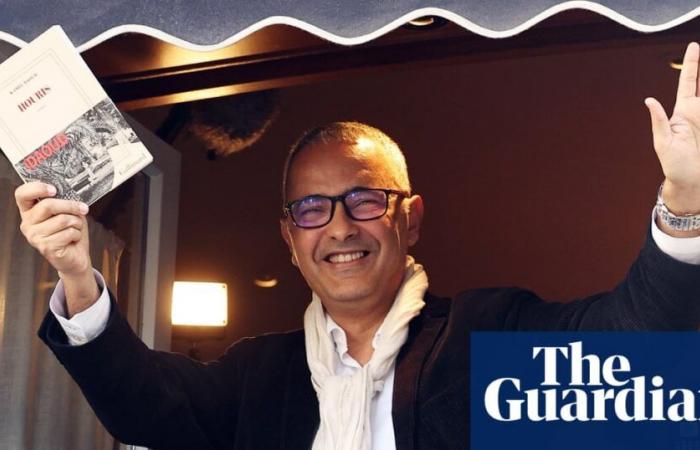
Novels about wide-scale violence in Algeria and Rwanda have won France’s two most important literary prizes and been hailed as groundbreaking narratives about the pressure on younger generations to come to terms with conflict in post-colonial societies.
The French-Algerian writer Kamel Daoud won the Goncourt literary prize for his novel, Houris, about a young woman scarred by the violence of Algeria’s civil war in the 1990s. The writer and hip-hop artist Gaël Faye won the Renaudot prize for his bestselling novel, Jacaranda, about young people navigating the legacy of the 1994 Rwandan genocide.
The French president, Emmanuel Macron, congratulated the two writers, saying they had shown how the French language can evoke “beauty, tragedy and the universal”.
Daoud’s powerful and shocking novel was praised by the Goncourt jury for its tragic lyricism. A fictional account of a young woman who was mutilated aged five during the civil war, the book asks how Algerian society can rebuild itself amid the trauma left by the 10-year conflict. Between 1991 and 2002, the conflict between the Algerian government and Islamist groups resulted in up to 200,000 deaths and thousands of disappeared, victims of torture and sexual violence.
Daoud is the first Algerian novelist to win France’s top literary prize.
But the novel, which was published in France in September, has caused controversy in Algeria. At the beginning of the book, Daoud cites the law in Algeria that restricts what can be said about the decades-long conflict of the 1990s and states that anyone using the “wounds of the national tragedy” to weaken the state can be punished by prison or a fine. While the book has therefore not been published in Algeria, Daoud told a French literary festival in September he understood that pirated copies had been circulated there and told Le Monde he would like to see the book published in the country.
Daoud’s French publisher, Gallimard, said it was told not to attend the prestigious Algiers book fair this month, which was interpreted by the French media as Algerian authorities’ reacting over Daoud’s book.
Daoud was born and grew up in Algeria and worked as a journalist in the city of Oran during the 1990s violence that became known as Algeria’s “black decade”. He has since taken French nationality and works as a columnist for the French magazine Le Point. He has published several novels including the acclaimed The Mersault Investigation, a post-colonial retelling of Albert Camus’s novel, The Outsider, from an Algerian perspective.
Daoud told Le Monde that so little was taught about the violence of the 1990s in Algeria that his own teenage daughter did not at first believe the book could be based on real events. He said Algeria’s war of independence against France was well-taught and documented but the violence of the 1990s had not been addressed. “I think that above all, we’re ashamed,” Daoud told Le Monde. “During the war of independence, violence was noble, we were defending ourselves against the enemy. In 1992, we were killing amongst ourselves.”
The Renaudot prize, regarded as a key driver of sales in French publishing, was won by Faye, a hip-hop artist and one of France’s most popular writers. He was born in Burundi to a Rwandan mother and French father. Faye’s novel Jacaranda is a haunting exploration of the legacy of Rwanda’s 1994 genocide against the backdrop of the country’s political and economic transformation. Characters from younger generations in Rwanda and the diaspora carefully attempt to unpick the silence of older relatives who struggle to find words for the unspeakable. It became a bestseller when it was published in September.
Faye’s first novel, Small Country, about a 10-year-old who comes of age during the Burundi civil war, sold more than 1.5m copies, was translated into 45 languages and adapted for the cinema and as a graphic novel.
Faye told France Inter radio: “Rwandan society is a young society, 70% of the population was born after 1994 … I was 11 at the time of the genocide and I felt a kind of responsibility, because when you chat to young people, they are conscious of the genocide but are also surrounded by silence. Often the words are lacking.”





